January 2011 Issue of EO's Book Review
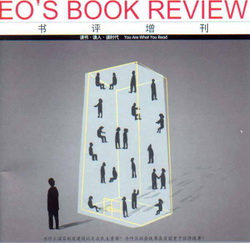
Highlights from this month's issue of EO's Book Review
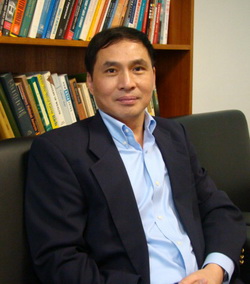
A Political Scholar's Perspective
By Li Xiang (李翔) and Xu Zhiyuan (許知遠(yuǎn))
Highlights from an interview with Zheng Yongnian (鄭永年)
[HIGHLIGHT] p. 7-15
Original Article: [Chinese] 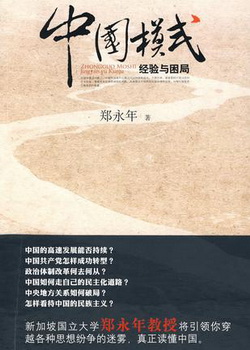 China Model - Experience and Difficulties (中國(guó)模式-經(jīng)驗(yàn)與困局)
China Model - Experience and Difficulties (中國(guó)模式-經(jīng)驗(yàn)與困局)
By Zheng Yongnian (鄭永年)
Zhejiang People's Publishing House, Jan 2010
"To explain China, we must adopt the scientific thinking of the West.China does not have a method of scientific thought; we have thousands of years of historical study. We can borrow their methods, but not their analysis. Their analysis comes from observing their own societies. It will be a mistake to apply their conclusions to our situation.
I originally studied psychology; it's had a deep impact on me. We are using a type of political thought produced by the west. But if you look at it, America, England, Germany, Italy, are all very different ... but they have a similar way of thinking about problems.
... we call it 'Social Science,' because 'science' is the method, society is the topic. We are using science to explain a very different kind of society."
"Civil Society in the West values self-determination and independence. Chinese Society is a different type of animal. For example, look at Beijing. The center of Beijing is Zhongnanhai, that is the seat of power, and then you have the second ring, the third ring etc, the rings are all dependent on the center. This isn't to say that 'dependence' necessarily excludes self-determination. In the west, the further you are from the government, the more freedom and autonomy you have. It is the opposite in China. The closer you are to the government, the more the government trusts you, the more autonomous you are. If the government doesn't trust you, they treat you as a dissident and have you killed."
The Party as Modern Emperor
"I feel that Leninism and Marxism are rather recent influences on Chinese thought, As far as China is concerned, the only difference between yesterday's imperial power and today's one-party system is that today's system is more belligerent. Nothing much has changed."
"We are not progressing as much or as fast as we had imagined, but nor will we slip and fall behind."
The 'China Model' is a Confused Concept
"I think when people refer to the 'China Model' they are referring to a confused concept. When people say the 'China Model,' they really mean China's 'reform model,' or China's 'policy model.' There is something to be learned from both, but there's also a lot that shouldn't be adopted.
If we are talking about influence on the west, it's mainly about balancing the market and state policy and how and how much the state should interfere in the economy."
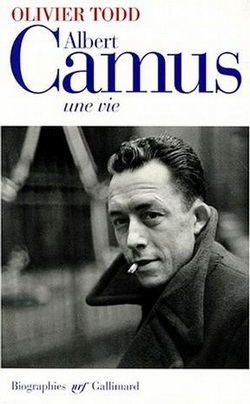
I am at Peace, Home is Nowhere
By Yun Yetui (云也退)
[LITERATURE] p. 24
Original Article: [Chinese]
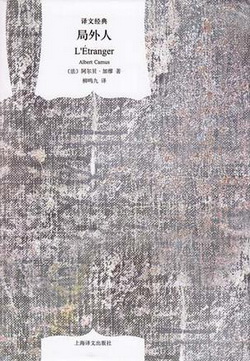 L’étranger (局外者)
L’étranger (局外者)
by Albert Camus
Libraire Gallimard, 1942
Translated by Liu Mingjiu (柳鳴九)
Chinese translation published by Shanghai Translation Publishing House, September 2010
Albert Camus, Une Vie (加繆傳)
by Oliver Todd
Gallimard-Jeunesse, 1996
Translated by Huang Xiyun (黃晞耘), He Li (何立) and Gong Mi (龔覓)
Chinese translation published by Commercial Press, October 2010
Albert Camus is a fascinating subject for study. Despite remarkable contributions to literature and a frenzied career in theater, journalism, and political activism, Camus felt himself the perpetual outsider. His writing is remembered as one of the defining voices of metaphysical angst and nihilism of the twentieth century.
Albert Camus, Une Vie, explores Camus's French Algerian upbringing and its impact on Camus's experience as an outsider, enveloped by loneliness. Todd is primarily interested in Camus's inner life, and provides painstaking interpretations of everyday details, sometimes overreaching.
In Todd's narrative, Camus's journey is defined by displacement and exile. Despite a rich life, Camus never stops complaining about Paris or France. In Camus's philosophy as well as his life, home is always a paradise lost, a place defined by its absence.
Todd is particularly compelling in providing a loveable and sympathetic subject without glossing over Camus's flaws
Also in Literature:
Chen Yangjing (陳嫣婧) reviews a new translation of the Short Stories of Italo Calvino
Song Jingru (宋靜茹) reviews a recent translation of Jean-Louis Curtis's Le Jeune Couple
and Zhang Hua (張華) reviews Hai Qing's (海青) book “自殺時(shí)代”的來(lái)臨?or Approaching the "Era of Suicide"?
[BUSINESS]
Li Xiang (李翔) writes about the history of the Rothschild family, the wealthiest bloodline in the world
Zhang Xiaoping (張小平) on books that reflect the current economic climate
[DIALOGUE]
Tan Xufeng (譚旭峰) interviews Zhang Dachun (張大春)
Guo Yujie (郭玉潔) interviews Bei Dao (北島)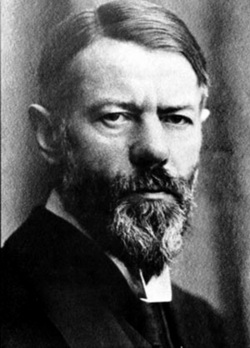
The Freedom and Dignity of the Modern Man
By Yan Kewen (閻克文)
[ACADEMIC] p.37
Original Article: [Chinese]
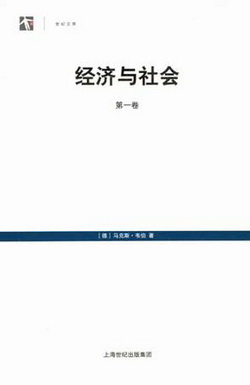 Economy and Society (Wirtschaft und Gesellschaft or 經(jīng)濟(jì)與社會(huì))
Economy and Society (Wirtschaft und Gesellschaft or 經(jīng)濟(jì)與社會(huì))
By Max Weber
1922
Translated by Yan Kewen (閻克文)
Chinese translation published by Shanghai People's Publishing House, October 2010
Weber's classic Economy and Society begins with economic activity, a process fundamental to individuals and societies bent on survival. At its heart, Economy and Society sees that man, especially modern man, is a thinking animal. Weber's focus is therefore on the human subject, and meaning in reference to "the subjective."
Weber lived during the rise of science and an era that embraced the rhetoric of progress. But Weber's subjectivism is concerned more with perception and reality, what man thinks and when. Unlike many of his contemporaries, Weber does not take a deterministic view toward human life.
In Economy and Society, a type of capitalism is an integral part of human activity and as old as the species. But Weber's capitalism was about fulfilling needs, and modern capitalism is more and more about the production of new needs and the perpetuation of an endless, inescapable cycle.
Economy and Society does not necessarily provide answers for modern life, but as a work of sociology, it offers a type of 'history' of the human species. Weber gives us a fundamental characterization of man as a purpose-oriented being, what we have always been, and what we will continue to be.
The Good Life
By Zuo Ye (左頁(yè))
[ACADEMIC] p.37
Original Article: [Chinese] 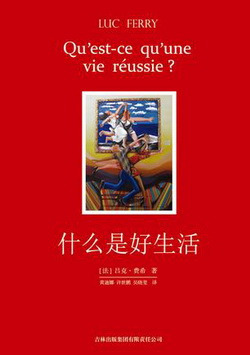 What Is the Good Life? (Qu’est-ce qu’une vie reussie? or 什么是好生活)
What Is the Good Life? (Qu’est-ce qu’une vie reussie? or 什么是好生活)
By Luc Ferry
University of Chicago Press, 2005
Translated by Huang Dina (黃迪挪)
Chinese translation published by Jilin Publishing Group, November 2010
The question "What is a good life?" has enjoyed unwavering popularity in the history of philosophical inquiry.
Thinkers disagree on the answer, but one thing seems to be certain, a life lived in contemplation of the "good life," rarely ends up being a "good life." Marx lived in abject poverty, Socrates was convicted of corrupting the youth and forced to drink hemlock, and Nietzsche went insane and died alone.
Ferry's question is not so much "what is a good life," but rather "how do we live a good life in this modern world?"
To answer this question, Ferry turns to Nietzsche.
Ferry adopts Nietzsche's historical explanation of the question. That is, since "God is dead," what does the "good life" become in the absence of God?
Reading Nietzsche as a materialist, Ferry concludes with him that life requires a "bursting" of false hope and delusions. Ferry's ultimate answer is equally Nietzschean, that is, the modern man becomes a "man-god," and a "man of action."
But Ferry's conclusion is not new, nor is it a satisfying answer to a pressing and "dangerous" question.
Also in Academic:
Wang Dongdong (王棟棟) reviews The Destiny of Chinese Culture (中國(guó)文化的命運(yùn)) by Liang Shuming (梁漱溟)
and Su Xiaohe (蘇小和) reviews a recent translation of Liberty Bell: America's Cultural Heritage (自由鐘與美國(guó)精神) by Peter Lillback
You can download a copy of the January 2011 issue of the EO's Book Review here.
Links and Sources
EO's Book Review: Official Site
Douban: EO's Book Review
Economic Observer: December Issue of EO's Book Review
Economic Observer: November Issue of EO's Book Review
The views posted here belong to the commentor, and are not representative of the Economic Observer |
Related Stories
Popular

- EO QUARTERLY
- The EO Quarterly - Winter 2010/2011
- A selection of predictions for 2011, a survey of CEOs about their expectations for the com...
Interactive
Multimedia

- EEO.COM.CN The Economic Observer Online
- Bldg 7A, Xinghua Dongli, Dongcheng District
- Beijing 100013
- Phone: +86 (10) 6420 9024
- Copyright The Economic Observer Online 2001-2011
















